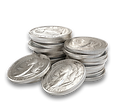Gold vs Real Estate: Which Is the Better Safe Haven?
- GoldsilverJapan

- Sep 25, 2025
- 6 min read
In times of economic uncertainty, geopolitical tension, and market volatility, investors increasingly turn to “safe haven” assets to protect their wealth. Two of the most popular options for long-term security are physical gold and real estate. But which one is better?
This comprehensive guide explores the differences, benefits, and risks of investing in gold vs real estate. We'll evaluate factors like liquidity, accessibility, risk management, inflation protection, and long-term returns—helping you make a more informed decision based on your financial goals.
🔍 What Is a “Safe Haven” Investment?
A safe haven investment is an asset expected to retain or increase in value during market turbulence. The primary goals are to:
Preserve capital
Reduce portfolio volatility
Hedge against economic, political, or currency risk
Historically, both gold and real estate have been viewed as long-term safe havens, but they work in fundamentally different ways.
🟡 Investing in Gold: Overview
Gold has been a store of value for over 5,000 years. As a hard, tangible asset, it cannot be printed, diluted, or manipulated in the same way fiat currency can.
Common Forms of Gold Investment:
Gold Bullion: Bars or coins, held physically or in allocated storage.
Gold ETFs: Exchange-traded funds tracking the price of gold.
Gold Mining Stocks: Indirect exposure through companies.
Digital Gold: Online accounts backed by real metal (e.g., Tanaka Kikinzoku in Japan).
In this article, we’ll focus primarily on physical gold bullion, since it's the most direct and time-tested form of gold investment.
🏠 Investing in Real Estate: Overview
Real estate—whether residential or commercial—has historically been a pillar of wealth creation across generations. Property tends to appreciate in value over time while also offering rental income.
Common Forms of Real Estate Investment:
Direct ownership (single-family homes, apartment buildings, commercial spaces)
REITs (Real Estate Investment Trusts)
Crowdfunded Real Estate
Vacation rentals (e.g., Airbnb)
In this comparison, we’ll focus on direct ownership of real estate properties.
⚖️ Key Comparison: Gold vs Real Estate
Let’s break down the main differences between these two assets:
1. 🏦 Liquidity
Gold: Highly liquid. Can be sold almost instantly to dealers, online marketplaces, or platforms like GoldSilverJapan.
Real Estate: Illiquid. Selling a property can take weeks or months and involves legal and transactional complexities.
✅ Winner: Gold
2. 📉 Volatility & Risk
Gold: Subject to price swings, but doesn’t go to zero. Price volatility is often driven by macro events (inflation, interest rates, war).
Real Estate: Market risk, tenant risk, and location risk. Real estate crashes (e.g., 2008) can wipe out equity.
✅ Winner: Depends on timeframe and market. Gold is safer in crisis; real estate offers steady returns in stable times.
3. 💰 Income Potential
Gold: Does not generate income. You profit only from capital gains.
Real Estate: Generates rental income monthly. Can offer strong cash flow with good property management.
✅ Winner: Real Estate
4. 💳 Entry Cost
Gold: Accessible to all. You can start with a 1-gram bar or even a $3 junk silver dime.
Real Estate: Requires large capital. Down payments, closing costs, taxes, and maintenance add up.
✅ Winner: Gold
5. 🏦 Storage & Maintenance
Gold: Requires secure storage (home safe, vault, or third-party storage).
Real Estate: Ongoing maintenance, repairs, property management, taxes.
✅ Winner: Gold (easier to manage)
6. 💹 Inflation Protection
Gold: Strong hedge against inflation. Historically maintains purchasing power over time.
Real Estate: Also protects against inflation, especially with rental income adjusting over time.
✅ Winner: Tie
7. 🔐 Ownership Privacy
Gold: If purchased privately (not reported), it offers discreet ownership.
Real Estate: Registered with government entities. Highly visible asset.
✅ Winner: Gold
8. 🌍 Global Portability
Gold: You can transport or store gold internationally. Useful in emergencies or relocation.
Real Estate: Fixed-location asset. Cannot be moved.
✅ Winner: Gold
9. 💸 Taxes
Gold: Subject to capital gains tax when sold. Tax rules vary by country.
Real Estate: Rental income is taxable. However, many deductions (mortgage interest, depreciation, repairs) can reduce tax liability.
✅ Winner: Real Estate (for income investors)
10. 🔧 Customization
Gold: Passive asset. You cannot enhance or customize its value.
Real Estate: You can renovate, redevelop, or rezone to increase value.
✅ Winner: Real Estate
📈 Historical Performance
📊 Gold
During crises like 2008, COVID-19, and inflation waves, gold often spikes.
From 2000 to 2020, gold surged from $300/oz to over $2,000/oz.
Less volatile long-term, but lacks consistent income.
🏡 Real Estate
Properties generally appreciate 3–5% annually over long periods.
Rental income compounds wealth over time.
However, bubbles can burst. 2008 saw property values drop 30–50% in many areas.
🔒 Risk Factors to Consider
🟡 Gold Risks:
No income generation
Theft (if stored poorly)
Counterfeit coins (buy from trusted dealers)
Market timing risk (buying at peak)
🏠 Real Estate Risks:
Tenants not paying rent
Property damage
Economic downturns
Regulatory changes (e.g., rent control)
🛠️ Diversification Strategy: Use Both
You don’t have to choose just one.
Smart investors understand that diversification across multiple tangible assets is one of the most effective ways to preserve wealth in the long run. While gold and real estate serve different functions in a portfolio, they can complement each other beautifully—especially during turbulent economic times.
💡 Suggested Portfolio Mix:
5–15% in gold and silver for crisis protection
15–30% in real estate for income and growth
The rest in diversified equities, cash, or bonds depending on your profile
📏 Look Beyond the Dollar: Value-Based Diversification
Rather than only comparing prices in fiat currency (like USD or JPY), consider using value-based ratios to help determine whether gold or real estate is relatively overvalued or undervalued. Why?
The dollar is not a reliable measuring stick during times of high inflation or currency devaluation. Its purchasing power changes constantly.
Instead, you can compare real assets directly against each other, for example:
🏠 Gold-to-Real Estate Ratio:
Track how many ounces of gold it takes to buy a 100-square-meter apartment in your city. If gold becomes relatively "cheaper" compared to real estate, it may be time to shift some assets into gold—and vice versa.
📈 Gold-to-Dow Ratio:
This measures how many ounces of gold are required to buy the Dow Jones Industrial Average. Historically, it cycles between overvaluation and undervaluation phases for both assets. A lower ratio may indicate that gold is undervalued relative to stocks.
🔄 Adjusting Your Portfolio Dynamically:
By monitoring these historical asset ratios, investors can:
Reduce risk of overexposure to one asset class
Rebalance their portfolios at more favorable times
Hedge more effectively against inflation or asset bubbles
This dynamic approach helps preserve purchasing power and enhance long-term returns in a more meaningful way than merely tracking fiat-denominated prices.
🌏 Where to Buy Gold or Real Estate?
🟡 For Gold:
Apmex (USA-based)
Tanaka Kikinzoku (Japan digital gold service)
GoldSilverJapan (physical bullion with local & global inventory)
Tokuriki Honten (also offers gold bars in Japan)
🏠 For Real Estate:
Domestic real estate agencies
REIT platforms
International property expos (be careful of legal pitfalls)
📘 Case Study: 2020–2024
During COVID and the post-pandemic recovery:
Gold surged as investors fled to safety.
Real Estate boomed in 2021 due to low interest rates.
By 2023, rising interest rates caused real estate corrections, while gold held stable.
This shows how both assets react differently to macro conditions—and why having both is a smart long-term strategy.
🤔 Frequently Asked Questions (FAQs)
Q1: Which is better for a beginner investor?
Gold is more accessible and less complex for beginners.
Q2: Can I use gold as collateral for loans?
Yes, in some countries. Check local banks or gold loan providers.
Q3: Does real estate beat gold long-term?
Real estate often outpaces gold in long-term total returns due to income and appreciation—but with higher risk and effort.
Q4: What about silver?
Silver is like gold but more volatile. It’s also more affordable for small investors.
Q5: How do I store gold safely?
Use a bank vault, home safe, or professional bullion storage services.
Q6: Can I invest in gold online?
Yes—via platforms like Tanaka Kikinzoku or digital gold apps. Make sure it’s backed by real metal.
Q7: What if gold prices crash?
Unlike stocks, gold doesn’t go to zero. It’s a hedge, not a growth asset.
Q8: Is property a good inflation hedge?
Yes, especially if you own rental properties that adjust rents with inflation.
Q9: Can I sell gold instantly?
Yes. Most dealers buy back quickly with minimal friction.
Q10: Can I sell property instantly?
No. It often takes 30–90 days or more.
🧠 Final Verdict: Which Is the Better Safe Haven?
There’s no universal answer. The right choice depends on your:
Risk tolerance
Income needs
Investment timeline
Portfolio size
🟡 Choose Gold if you want:
Instant liquidity
Portability
Simplicity
Crisis protection
🏡 Choose Real Estate if you want:
Monthly income
Tax benefits
Leverage opportunities
Long-term compounding
🛡️ Our Recommendation
At GoldSilverJapan, we believe in the power of tangible, secure wealth. Many of our customers start with gold or silver before diversifying into global real estate or other hard assets.
For example:
New buyers start with a 1 oz Britannia Silver Coin
Others build a portfolio of gold bars with monthly savings
Advanced clients expand into global mints like Perth Mint or Royal Mint bullion
Whether you're just getting started or already holding real estate, gold is a foundational safe haven that complements any portfolio.
Start your journey today at GoldSilverJapan and build true wealth with real assets.
Let your gold do the guarding. Let your property do the growing.











Comments